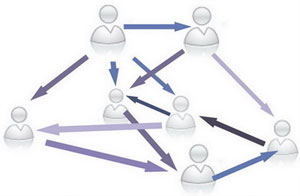Listening Post: Tubular Proliferation
NCPR and all the broadcasters of the nation went through a test of the National Emergency Alert System last Wednesday at 2 pm. Alarming buzz tones preceded and followed a short test message on schedule, so in that sense it was a success. There were issues; the sound quality was reminiscent of the automated stop announcements on the subway. In fact, it sounded as if the message had been beamed forward from the middle of the last century–back when you could actually reach the majority of Americans, all at the same time, via broadcast services.
Over the last two decades, the appointment consumption of broadcast media has dwindled to a shadow of its former self. If the whole nation needs to know something right now, pre-empting broadcast just won’t get it done. Some people watch and listen on-demand, some time-shift by recording, some only watch what Facebook friends recommend. Some were watching their TVs at the right time, but were streaming an old episode of The Avengers, or watching a cat chase a laser pointer on Youtube. Some were plugged into the radio, but it was internet radio, steaming their favorite tango show from Argentina.

Many to many
Despite the common use of the term “mainstream media,” it has become an oxymoron. The mighty Mississippi of broadcasting has silted up now into the infinite channels, backwaters and bayous of new media. The rise of many-to-many communication has overturned such notions as “paper of record,” “the evening news,” “Top 40 Hit,” “major network.” It is increasingly impossible to characterize “the media” as too corporate, or too liberal, or too conservative, or too anything, because media (plural of medium) has thousands of forms and sources once again.
The media (singular) died with the 20th century, living on in the cultural vocabulary as a vestigial organ. Its former clout can sometimes still be detected. For example, city water managers can tell you the exact timing of commercial breaks during the Super Bowl by watching water usage spike as a myriad toilets flush simultaneously. But that is nothing like the vision the broadcasters of old had for their role–as powers in their own right, molding public opinion, curating the cultural zeitgeist, as arbiters of civic debate, and a fourth branch of government. The media game has changed: once it was Monopoly, now it’s Fifty-Two Pickup.
Tags: listeningpost








Dale you make some interesting observation that while true, I hadn’t given much thought about.
Yes, the days of the three networks and everyone talking about the program they watched are long past. Remember “Who shot JR?”
I remember the 50’s when every Saturday at noon the air raid sirens would blare to remind everyone of the danger of an atomic attack coming from Russia.
Ah, yes, times do change. I guess in a way we have all “Tuned in, turned on and dropped out.”
Dale –
Something that kinda fits, in my aging mind, with the weirdness of the test. Saturday night, CBS ran an hour of a Republican debate. Because it was a Republican debate, and because it was Saturday night, it was lightly viewed – about 5 million people.
CBS decided to put the last 30 minutes out as web only. The servers didn’t exactly crash, but it was impossible to really watch the thing. Remember, this is the big leagues, CBS and all, and they could not scale over the course of 30 minutes to meet the demand.
The standard answer is: we just need to get more bandwidth out there. I’m not so sure that’s what we’re seeing. My gut is that it’s more like what Robert Moses saw when he was building roads around New York in the 30s. He’d plan one, his guys would predict it would solve traffic problems for 10 years, and the roads would fill up really quickly.
All of which is to say, the one to many model has obvious problems, but so does the alternative.
best,
Scott A.
Super Bowl, Schmuper Bowl, Dale: I’ll bet city water managers can attest to the clout of a certain regional media powerhouse when, at 9:55am on Sundays, all the North Country toilets flush simultaneously in preparation for an unimpeded listen to “On the Media” on NCPR.
A curious observation, Scott: “Because it was a Republican debate, and because it was Saturday night, it was lightly viewed…”
–Bob
Bob –
You’re right.
In my haste I didn’t quite write what I meant to, which was ‘Because it was yet another Republican debate…’ my point being there are about a zillion of them, and even partisans are admitting to being a little overwhelmed by the sheer quantity.
I *didn’t* mean, ‘Oh, it’s just the Republicans.’
As for Saturday night, the networks have abandoned original programming because viewing levels are so low. (Or maybe it’s vice-versa, but the nets will never admit to that.)
s.
Interesting story and interesting comments.
So what does Dale’s original point say about how rapidly and effectively important information is shared today vs. the old days?
Seems like the last really big story, the killing of bin Laden, I guess, spread very quickly, with people running to their TVs when informed by friends, relatives, or other media.
I wonder how that event (breaking on a Sunday night) compared with response to the JFK assassination response (on a Friday mid-day), occurring around the height of the dominance of 3 network TV.
Nice commentqary, Dale. I especially liked your metaphors, e.g. Monopoly vs. 52 Pick up. By the way, does anyone, besides Freddie Mae and Fanny Mac, play Monopoly anymore?